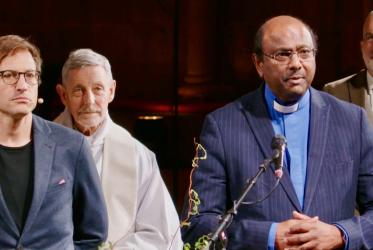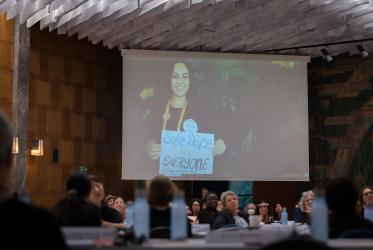An Ecumenical Strategic Forum on Diakonia and Sustainable Development was convening this week, drawing 130 thinkers from across the globe who have agreed to seek a common vision for churches and strengthen their ability to collaborate.
The forum, hosted by the World Council of Churches (WCC), is taking place 3-6 October at the Ecumenical Centre in Geneva. Its objective is to strengthen ecumenical collaboration on diakonia and development; stimulate strategies for leveraging national impact; and provide direction for the ecumenical accompaniment of the 2030 agenda for sustainable development.
World Council of Churches (WCC) Central Committee moderator Dr Agnes Abuom described the forum as a vital aspect of a journey together as it provides the opportunity to review the context and impact of various ministries. “Further the forum is also a time to reflect and plan together for the future, acknowledging our different roles and their interrelatedness,” she said. “The theme is of great importance to all of us and our institutions because it resonates with our identities and mandates as faith-based organizations and the ecumenical movement at large.”
In his presentation, WCC general secretary Rev. Dr Olav Fykse Tveit said: “In the month of commemorating 500 years of Reformation, a modest contribution to our joint reflection and actions for a new transformation of the world towards unity, justice and peace, maybe could be expressed in 1/10 of the amount of theses that initiated the transformation called ‘Reformation’.”
Tveit said: “When we try to discern the signs of our times, we see many tendencies towards different quests for unity.”
He added: “There is a sense of being one world through new possibilities of communication and sharing information, connecting people through enormous and sometimes unlimited openness, but also making the world a globalized marketplace dominated by a few and powerful actors, some with little or no ethical or value-based standards.”
Tveit said also: “There is a new momentum for the unity of the church. The connection between a new quest for unity and a new quest for ecumenical diakonia should manifest itself in new initiatives towards more mutual accountability.”
Tveit concluded: “For the constant renewal and reformation of the churches and human societies we cannot wait for figures like Martin Luther or Martin Luther King. We all have to be, and we all can be, agents of change for unity, justice and peace.”
Prof Dr Kjell Nordstokke offered a presentation on the document “Ecumenical Diakonia,” which takes into account the longstanding experiences of diaconal practice and reflection within the ecumenical movement. The text also considers the specific contribution of specific diaconal agencies; responds to relevant political and social issues in today’s world; provides theological insight; and proposes concrete steps to strengthen the diaconal capacity of the churches in cooperation with their ecumenical partners.
Rev. Jörgen Thomsen, representing DanChurchAid, reflected that more and more people are starting to realize that faith informs world views and shapes behavior, and many are seeking cooperation with faith actors in the world.
“In this new dialogue I expect us to be courageous,” he said. “The most courageous act you can perform is to actually say ‘welcome’ to somebody you don’t know: Welcome to those who invite us to cooperate for change.”
“For us in the LWF, partnership can only be defined as accompaniment,” the LWF general secretary Rev. Martin Junge said. “In times of fragmentation and communication breakdowns our ability to work and stand together as partners in diakonia becomes a telling witness to the power of the gospel of Jesus Christ in our hearts.” Junge underlined the need to invest more in theological education and formation.
ACT Alliance general secretary Rudelmar Bueno de Faria noted that over the years churches have been major actors in development in almost all continents. “It is something that we cannot ignore, especially if we consider the social capital they can mobilize - volunteers and more,” he said. “Nobody else can do the same.”
We are now in a change of era, he added. “Conflicts are increasing everywhere, with migration and displacement reaching records. We are facing increasing populism in very corner of the planet, hatred speeches, exclusion, discrimination, xenophobia, racism, and homophobia.”
“As churches and faith communities, we cannot be silent,” he concluded. “We have to act and to speak out."
Photos from the Ecumenical Strategic Forum (download free of charge)
9.5 Theses by the WCC general secretary
Ecumenical Strategic Forum on Diakonia and Sustainable Development




